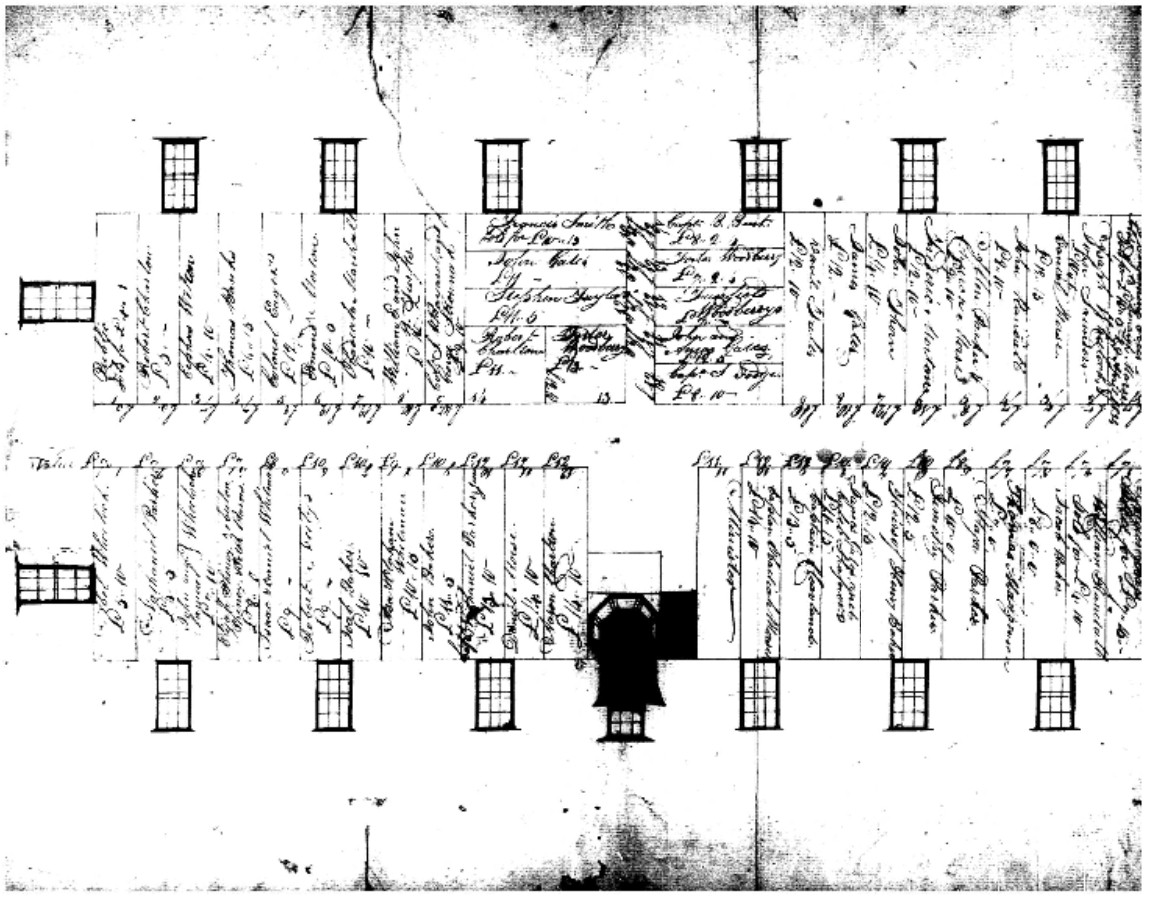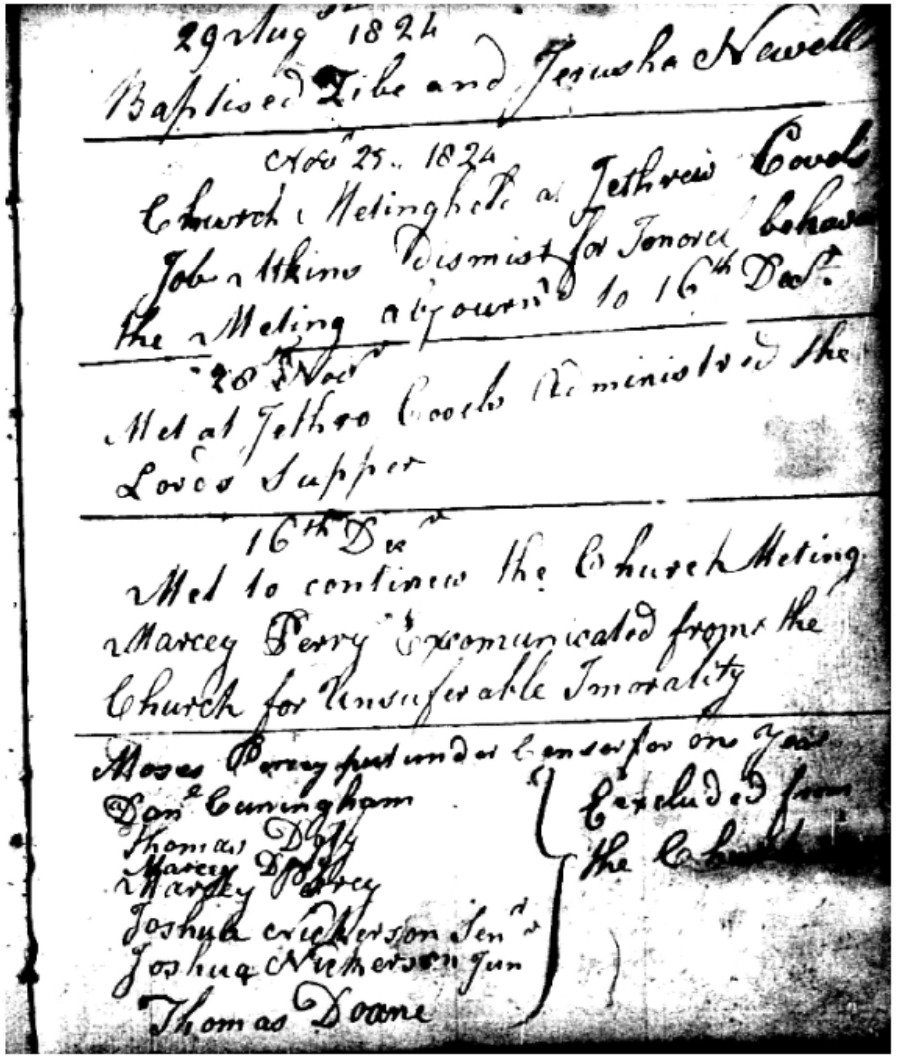- Submitted on
- 2 comments
The crucial interactions and key events of a community in colonial North America were often played out within the confines of the church. The Loyalist Collection includes a wide range of church records from New Brunswick, Nova Scotia, Ontario, and Quebec which hold very useful information for locating and identifying individuals, such as baptismal, marital, and burial records. They also contain some fascinating documents that give a vivid picture of life in the colonial Atlantic World. By just perusing the records of a single church, a researcher can come across some remarkable and easily overlooked pieces of information.
Seats for Rent
Within many Christian denominations in North America, pews were often rented to individuals or families to support the preacher and/or church upkeep; one of the reasons for this was the lack of tithing in the New World although tithing was widely practiced in Europe. The designation of pews could be a significant indicator of social status as prime seating came at a higher price. Below is a pew map created for the United Baptist Church of Nictaux, Nova Scotia. The cost of each pew is labeled on the map, and certain sections are more costly than others. Some members of the original building committee, dating from 1813, can be seen in the map: Timothy Parker, Nathaniel Parker, Captain Cleaveland, “Cap. S. Dodge” (most likely Samuel Dodge—this pew was located front and centre in the church), and Captain Obadiah Morse, the son of Planter Abner Morse of Massachusetts, whose seat was located directly behind the minister. In the upper left there is a pew which appears to have been left “public” for free use. The pew map also functioned as a compact social model of the religious community as the preferential seating was linked to social standing.
Censures and Excommunications
The United Baptist Church of Centreville, Shelburne County, Nova Scotia included censures in its records, which is a type of penalty imposed on church members in some denominations. Censures demonstrated moral and spiritual disapproval by temporarily banning a member from the church. In the Baptist Church, censure could be applied (among many reasons) for theft, attending plays, dancing, drinking excessively, or any type of sexuality practiced outside of heterosexual marriage. The censure could be removed and the individual’s church privileges restored with proper repentance. Excommunication was a censure of the highest degree, and the member would be prohibited from returning to the church. This punishment was especially common in the Baptist Church for adultery or “fornication”. An example of a censure from the United Baptist Church at Centreville in 1824 was “Job Atkins Dismist for imorel behavior.” This censure occurred only three years after the church was founded in response to a religious revival in Cape Sable Island. On December 21st of the same year, Marcey Perry was “Excommunicated from the Church for Unsuferable Imorality.” Interestingly, the record does not specify to the nature of her spiritual infraction. Also on December 21st, Moses Perry was “put under censure for one year.” Included on the same page was a list of seven names “Excluded from the Church”: Daniel Cunningham, Thomas Doty (possibly a phonetic spelling of Doughty), Marcey Doty, Marcy Perrey (same as above), Joshua Nickerson Senior, Joshua Nickerson Junior, and Thomas Doane. There appeared to be family connections between some of these people, perhaps husband/wife and father/son pairs. Using the Nova Scotia census records of 1827 and 1838, all the censured males can be located, and they all remained living in Shelburne County as fishermen. Most, however, listed their religion in the census as a denomination other than Baptist, which was a way of staying in the community after censure.
Coming Up: Part two of “Surprising Church Records: Historical Clues Revealed”.
Sources
Lynne Marks, Kathryn McPherson, Cecilia Morgan, and Nancy M. Forestell, “No Double Standard?: Leisure, Sex, and Sin in Upper Canadian Church Discipline Records, 1800-1860” in Gendered Pasts: Historical Essays in Femininity and Masculinity in Canada, Toronto: Oxford University Press, 1999, pp. 48-64.
Esther Clark Wright, Planters and Pioneers, self-published, 1978.
Carl Zollmann, “Pew Rights in the American Law”, The Yale Law Journal, vol. 25, no. 6 (April 1916), pp. 467-480.
Leah Grandy holds a PhD in History and works as a Microforms Assistant at the Harriet Irving Library.



Comments Add comment
Centreville records
Centreville
You never know what you might find! It took a bit to figure out "Doty", but Doane is pretty clear.
Add new comment Comments